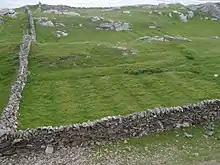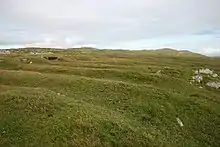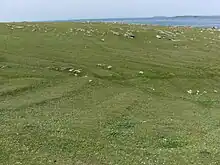Lazy bed
Lazy bed (Irish: ainneor or iompú, Scottish Gaelic: feannagan [ˈfjan̪ˠakən]) is a traditional method of arable cultivation. Rather like cord rig cultivation, parallel banks of ridge and furrow are dug by spade although lazy beds have banks that are bigger, up to 2.5 metres (8 ft 2 in) in width, with narrow drainage channels between them. It was used in southern parts of Britain from the post-Roman period until the post-medieval period, and across much of Ireland and Scotland until the 19th century.




Although it is largely extinct, it is still to be found in parts of the Hebrides and the west of Ireland. In these places, the method used is normally to lift up sods of peat and apply desalinated seaweed fertiliser to improve the ground. Potatoes were often grown in this way in these regions, until the potato blight Phytophthora infestans caused potato famine in the Highlands and Ireland.